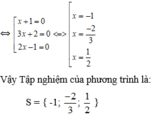Giải bất phương trình:
Hãy nhập câu hỏi của bạn vào đây, nếu là tài khoản VIP, bạn sẽ được ưu tiên trả lời.


9x2 + 4x – 3 – (3x + 2)2 > 0
⇔9x2 + 4x – 3 – (9x2 + 12x + 4) > 0
⇔ 9x2 + 4x – 3 – 9x2 – 12x – 4 > 0
⇔ – 8x > 7 ⇔ x < 7/-8 ⇔ x < -7/8
Tập nghiệm: S = {x|x < -7/8}

a) \(5x\left(x-3\right)^2-5\left(x-1\right)^3+15\left(x-4\right)\left(x+4\right)\le10\)
\(\Leftrightarrow5x\left(x^2-6x+9\right)-5\left(x^3-3x^2+3x-1\right)+15\left(x^2-16\right)\le10\)
\(\Leftrightarrow5x^3-30x^2+45x-5x^3+15x^2-15x+5+15x^2-240\le10\)
\(\Leftrightarrow\left(5x^3-5x^3\right)-\left(30x^2-15x^2-15x^2\right)-\left(45x-15x\right)+5-240\le10\)
\(\Leftrightarrow30x-235\le10\)
\(\Leftrightarrow30x\le10+235\)
\(\Leftrightarrow30x\le245\)
\(\Leftrightarrow30x:30\le245:30\)
\(\Leftrightarrow x\le\dfrac{49}{6}\)
Vậy nghiệm của bất phương trình là: \(x\le\dfrac{49}{6}\)
b) \(\left(3x-2\right)\left(9x^2+6x+4\right)+27x\left(\dfrac{1}{3}-x\right)\left(\dfrac{1}{2}+x\right)\ge1\)
\(\Leftrightarrow27x^3-8+27x\left(\dfrac{1}{9}-x^2\right)\ge1\)
\(\Leftrightarrow27x^3-8+3x-27x^3\ge1\)
\(\Leftrightarrow\left(27x^3-27x^3\right)-8+3x\ge1\)
\(\Leftrightarrow-8+3x\ge1\)
\(\Leftrightarrow3x\ge1+8\)
\(\Leftrightarrow3x\ge9\)
\(\Leftrightarrow3x:3\ge9:3\)
\(\Leftrightarrow x\ge3\)
Vậy nghiệm của bất phương trình là \(x\ge3\)
a: =>5x(x^2-6x+9)-5(x^3-3x^2+3x-1)+15(x^2-16)<=10
=>5x^3-30x^2+45x-5x^3+15x^2-15x+5+15x^2-240<=10
=>30x-235<=10
=>30x<=245
=>x<=49/6
b: =>27x^3-8+27x(1/9-x^2)>=1
=>27x^3-8+3x-27x^3>=1
=>3x>=9
=>x>=3

a) Điều kiện: x + 2 ≠ 0 và x – 2 ≠ 0 ⇔ x ≠ ± 2
(Khi đó: x2 – 4 = (x + 2)(x – 2) ≠ 0)



![]()
![]()
Vậy tập nghiệm của pt là: S = {-1; 1}
b) Điều kiện: 2x ≥ 0 ⇔ x ≥ 0
Khi đó: |x – 5| = 2x ⇔ x – 5 = 2x hoặc x – 5 = -2x
⇔ x = -5 hoặc x = 5/3
Vì x ≥ 0 nên ta lấy x = 5/3 . Tập nghiệm : S = {5/3}
c) x – 2)2 + 2(x – 1) ≤ x2 + 4
⇔ x2 – 4x + 4 + 2x – 2 ≤ x2 + 4
⇔ -2x ≤ 2
⇔ x ≥ -1
Tập nghiệm S = {x | x ≥ -1}

a) Ta có: \(2\left(3x+1\right)-4\left(5-2x\right)>2\left(4x-3\right)-6\)
\(\Leftrightarrow6x+2-20+8x>8x-6-6\)
\(\Leftrightarrow14x-18-8x+12>0\)
\(\Leftrightarrow6x-6>0\)
\(\Leftrightarrow6x>6\)
hay x>1
Vậy: S={x|x>1}
b) Ta có: \(9x^2-3\left(10x-1\right)< \left(3x-5\right)^2-21\)
\(\Leftrightarrow9x^2-30x+3< 9x^2-30x+25-21\)
\(\Leftrightarrow9x^2-30x+3-9x^2+30x-4< 0\)
\(\Leftrightarrow-1< 0\)(luôn đúng)
Vậy: S={x|\(x\in R\)}

a: \(x\left(x-1\right)+2x^2-2=0\)
=>\(x\left(x-1\right)+2\left(x-1\right)\left(x+1\right)=0\)
=>\(\left(x-1\right)\left(x+2x+2\right)=0\)
=>(x-1)(3x+2)=0
=>\(\left[{}\begin{matrix}x=1\\x=-\dfrac{2}{3}\end{matrix}\right.\)
b: \(9x^2-1=\left(3x+1\right)\left(2x-3\right)\)
=>\(\left(3x+1\right)\left(3x-1\right)-\left(3x+1\right)\left(2x-3\right)=0\)
=>\(\left(3x+1\right)\left(3x-1-2x+3\right)=0\)
=>(3x+1)(x+2)=0
=>\(\left[{}\begin{matrix}x=-\dfrac{1}{3}\\x=-2\end{matrix}\right.\)

Chọn a: \(x+5y+2\le0\) là bất phương trình bậc nhất 2 ẩn.

( 9 x 2 – 4 ) ( x + 1 ) = ( 3 x + 2 ) ( x 2 - 1 )
⇔ (3x – 2)(3x + 2)(x + 1) - (3x + 2)(x - 1)(x + 1) = 0
⇔(3x+ 2)(x + 1)(3x – 2 – x + 1) = 0
⇔ (3x + 2)(x + 1)(2x – 1) = 0


a)
\(\left(9x^2-4\right)\left(x+1\right)=\left(3x+2\right)\left(x^2-1\right)\)
\(\Leftrightarrow\left(9x^2-4\right)\left(x+1\right)=\left(3x+2\right)\left(x+1\right)\left(x-1\right)\)
\(\Leftrightarrow\left(9x^2-4\right)\left(x+1\right)-\left(3x+2\right)\left(x+1\right)\left(x-1\right)=0\)
\(\Leftrightarrow\left(x+1\right)\left[9x^2-4-\left[\left(3x+2\right)\left(x-1\right)\right]\right]=0\)
\(\Leftrightarrow\left(x+1\right)\left[9x^2-4-\left(3x^2-3x+2x-2\right)\right]=0\)
\(\Leftrightarrow\left(x+1\right)\left(9x^2-4-3x^2+3x-2x+2\right)=0\)
\(\Leftrightarrow\left(x+1\right)\left(6x^2+x-2\right)=0\)
\(\Leftrightarrow\left[{}\begin{matrix}x+1=0\\6x^2+x-2=0\end{matrix}\right.\Leftrightarrow\left[{}\begin{matrix}x=1\\\left(2x-1\right)\left(3x+2\right)=0\end{matrix}\right.\)
\(\Leftrightarrow\left[{}\begin{matrix}x=1\\x=\dfrac{-2}{3}\\x=\dfrac{1}{2}\end{matrix}\right.\)
Vậy \(x\in\left\{1;\dfrac{-2}{3};\dfrac{1}{2}\right\}\)
b)
\(\left(x-1\right)^2-1+x^2=\left(1-x\right)\left(x+3\right)\)
\(\Leftrightarrow x^2-2x+1-1+x^2=x+3-x^2-3x\)
\(\Leftrightarrow2x^2-2x=x^2-2x+3\)
\(\Leftrightarrow3x^2=3\)
\(\Leftrightarrow x^2=1\)
\(\Leftrightarrow x=\left(\pm1\right)^2\)
\(\Leftrightarrow\left[{}\begin{matrix}x=1\\x=-1\end{matrix}\right.\)
Vậy \(x\in\left\{1;-1\right\}\)